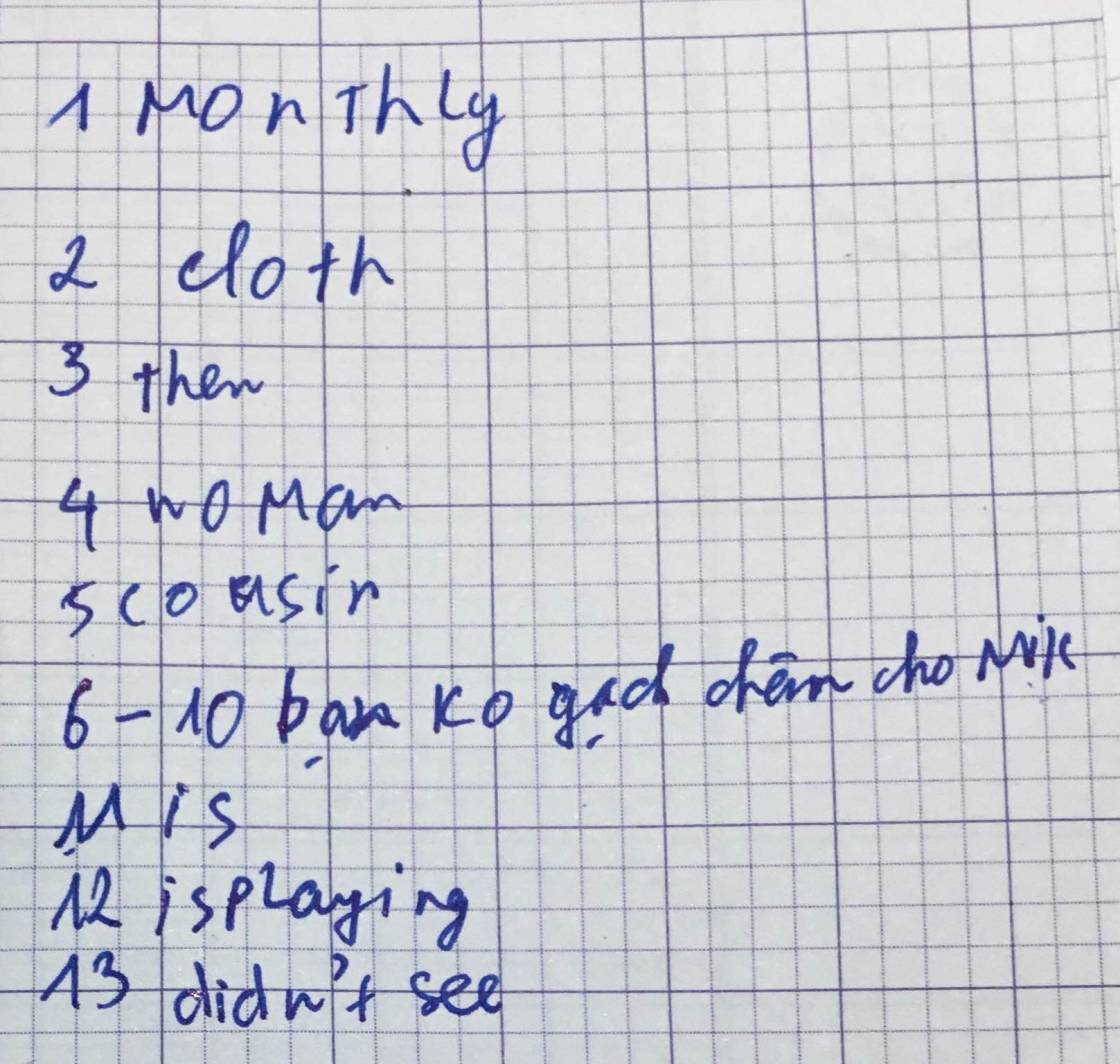I. Find the word with different sound in the underline part.
1. A. today B. taxi C. great D. late
2. A. developed /t/ B. remembered /d/ C. answered D. travelled
II. Find the word with different stress in each line.
3. A. ‘holiday B. po’llution C. ‘vehicle D. ‘wonderful
4. A. par’ticular B. con’dition C. ‘astronaut D. con’venient
5. A. pe’troleum B. en’vironment C. ‘alternative D. me’morable
III. Choose A, B, C or D that best completes the sentences.
6. These toys belong to my brother. These toys are ________.
A. him (tân ngữ) B. her (TTSH) C. his (ĐTSH) D. he (ĐTNX)
7. Lan: “Do you want to go to the museum with us?” – Peter: “________”
A. Titanic, please B. I’d like two tickets
C. Thanks, but I’d rather stay at home D. I enjoy watching film
8. Peter: “Where can I hung my coat?” – Tom: “________”
A. That’s very nice B. Put it in this closet
C. What I need is a new coat D. It’s very wet
9. The sun releases large amounts of ________ every day.
A. solar B. energy C. dust D. pollution
10. Disable people are able to drive ________.
A. underwater train B. airplanes C. driverless cars D. flying cars
11. Oil, coal, and natural gas are ________ fuels.
A. fossil B. solid C. smokeless D. unleaded
12. It’s important for us to reduce energy ________ as much as possible.
A. consumedly B. consumer C. consume D. consumption
13. In the future, there ________ less clean water for people.
A. will be B. is going to be C. would be D. is
14. It’s necessary to ____ public awareness of the problems of overpopulation.
A. upgrade B. rise C. lift D. raise
IV. Read the text and choose the best answer.
All living things depend a lot (15) ________ plants. Plants provide us with food and shelter. Many animals eat plants (16) ________ grass and wheat. We, in turn, kill them for (17) ________. Green plants also provide us with oxygen, something that we breath (18) ________ to live. Plants also provide us with wood so that we can make them (19) ________ materials for our house.
0798422176
Depend on: dựa vào cái gì
15. A on B. of C. from D. in
16. A. beyond B. like C. as D. near
17. A. rice B. teeth C. food D. eyes
18. A. out B. in C. back D. away
19. A. to B. of C. from D. into
V. Read the text and choose the best answer.
Jan Dibbets may someday have his work revered as much as his Dutch predecessors Vermeer, Van Gogh, and Rembrandt. At a time when the trends in art are toward abstraction and minimalism, Dibbets' work integrates these two disparate trends into one remarkable whole. 5 In one series of composite works, he arranged sections of architectural photographs into rounded patterns. Then, with pen and ink and watercolors, he connected the segments together into 360-degree circular forms blending the abstract with the real and the imagined. The imaginary images resemble the views of ceilings in gothic, baroque, and neo-classical 10 buildings as they might be seen from the ground floor.
20. What does this passage mainly discuss?
(A) the life of Jan Dibbets
(B) new forms of art created by Jan Dibbets
(C) an exhibit of abstract art
(D) art that follows the style of Vermeer, Van Gogh, and Rembrandt
21. As used in line 2, what is the meaning of the word "time"?
(A) season
(B) period
(C) century
(D) interval
22. The author implies that
(A) Dibbets is more well known to some people than Vermeer
(B) views of ceilings in gothic buildings are most beautiful when seen from the ground floor
(C) art is now becoming more abstract
(D) Dibbets preferred watercolor to photography
23. The word "remarkable" as used in line 4 could be best replaced by
(A) inseparable
(B) unified
(C) clever
(D) extraordinary
24. As described in this passage, Dibbets used all of the following elements EXCEPT
(A) pen and ink
(B) watercolors
(C) architectural photographs
(D) still-life drawings
25. The word "neo-classical" in line 9 refers to
(A) artistic patterns
(B) trends in art
(C) architectural styles
(D) museum decorations


1 B
2 D
3 A
4 A
5 A